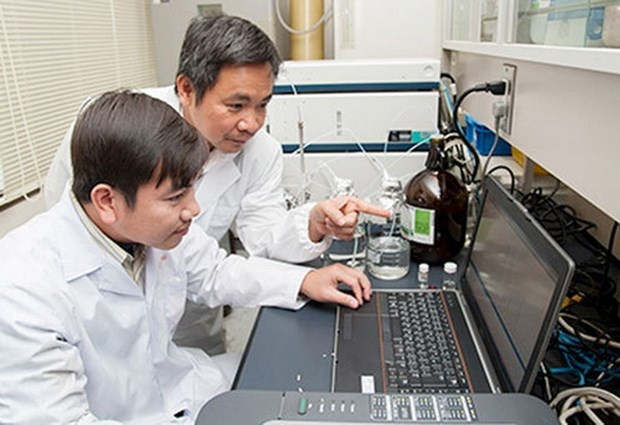The research team of Professor-Doctor Tran Dang Xuan of Hiroshima University has proven that the compound extracted from rice has the effect of inhibiting cancer cells and is safe for normal cells.

Professor-Doctor Tran Dang Xuan (right) and researchers at the Laboratory of Physiology, Botany and Biochemistry. Source: Hiroshima University
The research results were published in the cancer research journal Cancers in October 2022.
In this study, for the first time, scientists have clarified the cancer cell killing mechanism of compounds purified from rice husks, Momilactones A (MA) and Momilactones B (MB), through the mechanism of regulating related proteins (p-38, BCL-2, and caspase-3).
Additionally, momilactone can block the cell cycle at the G2 phase (the phase where everything needed for cell division is synthesized) by activating the p-38 protein and inhibiting the activity of the CDK1 and cyclin B1 complex.
The discovery of the cytotoxic properties of momilactone against cancer cells is expected to be a premise for future research and development of effective cancer treatment drugs based on this compound.
Dr. Nguyen Van Quan, Hiroshima University, said that the research team has clarified the mechanism of action of MA and MB, which increases the destruction process and inhibits the growth of cancer cells. In particular, with an equivalent concentration that causes cancer cell death, this compound is completely safe for normal cells.
Several previous studies worldwide have shown the anti-cancer potential of momilactones; however, the mechanism of cytotoxic action has not been thoroughly examined. In-depth studies on this compound are few because this compound is difficult to isolate, purify and very expensive.
The Laboratory of Plant Physiology and Biochemistry, Hiroshima University, headed by Professor Tran Dang Xuan, is one of the few laboratories in the world that can purify momilactones from natural sources such as rice.
In a January 2019 announcement, the group found and successfully isolated 600mg of MA and MB from 30kg of rice husks.
Professor Tran Dang Xuan said that many pharmaceutical companies in and outside Japan are working with research groups to develop industrial extraction of MA and MB, as well as clinical research to develop drugs to enhance the immune system, fight cancer, diabetes, and cosmetics.
Professor Tran Dang Xuan also said that many rice varieties in Vietnam have shown initial results containing quite high MA and MB content. Breeding rice varieties with high medicinal activity will contribute to increasing the value of Vietnamese agricultural products.
According to VNA